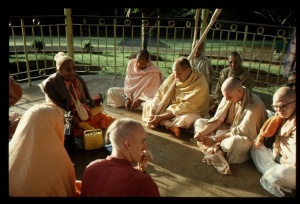SB 1.11.15 (1964): Difference between revisions
(Created page with "<div style="float:left">link=SB (1964) Eleventh Chapter - Lord Krishna's Entrance in Dwarka '''[[SB (1964) Eleventh Chapter - Lord Krishna's Entrance ...") |
(Vanibot #0020: VersionCompareLinker - added a link to the Version Compare feature) |
||
| Line 1: | Line 1: | ||
[[Category:Srimad-Bhagavatam (1962-1965) - Canto 01 Chapter 11]] | |||
<div style="float:left">[[File:Go-previous.png|link=SB (1964) Eleventh Chapter - Lord Krishna's Entrance in Dwarka]] '''[[SB (1964) Eleventh Chapter - Lord Krishna's Entrance in Dwarka]]'''</div> | <div style="float:left">[[File:Go-previous.png|link=SB (1964) Eleventh Chapter - Lord Krishna's Entrance in Dwarka]] '''[[SB (1964) Eleventh Chapter - Lord Krishna's Entrance in Dwarka]]'''</div> | ||
<div style="float:right">[[File:Go-previous.png|link=SB 1.11.14 (1964)]] '''[[SB 1.11.14 (1964)]] - [[SB 1.11.16 (1964)]]''' [[File:Go-next.png|link=SB 1.11.16 (1964)]]</div> | <div style="float:right">[[File:Go-previous.png|link=SB 1.11.14 (1964)]] '''[[SB 1.11.14 (1964)]] - [[SB 1.11.16 (1964)]]''' [[File:Go-next.png|link=SB 1.11.16 (1964)]]</div> | ||
{{CompareVersions|SB|1.11.15|SB 1964|SB 1972-77}} | |||
{{RandomImage}} | {{RandomImage}} | ||
| Line 6: | Line 8: | ||
==== TEXT No. 15 ==== | ==== TEXT No. 15 ==== | ||
<div | <div class="SB65verse"> | ||
Dwari dwari grihanam cha dadhi akshata phala ikshuvi | |||
Alamkritam purnakumbhair valibhir dhupa deepakaih. | |||
</div> | </div> | ||
| Line 14: | Line 16: | ||
==== ENGLISH SYNONYMS ==== | ==== ENGLISH SYNONYMS ==== | ||
<div | <div class="synonyms"> | ||
Dwari dwari—each and every house doors, Grihanam—of all the residential buildings, Cha—and, Dadhi—curd, Akshata—unbroken, Phala—fruit, Ikshu—sugarcane, Alamkritam—decorated, Purnakumbhai—full water-pots, Valibhir—along with things for worshipping, Dhupa—incense, Deepakaih—with lamps and candles. | Dwari dwari—each and every house doors, Grihanam—of all the residential buildings, Cha—and, Dadhi—curd, Akshata—unbroken, Phala—fruit, Ikshu—sugarcane, Alamkritam—decorated, Purnakumbhai—full water-pots, Valibhir—along with things for worshipping, Dhupa—incense, Deepakaih—with lamps and candles. | ||
</div> | </div> | ||
| Line 21: | Line 23: | ||
==== TRANSLATION ==== | ==== TRANSLATION ==== | ||
<div | <div class="translation"> | ||
In each and every door of the residential houses auspicious things like curd, unbroken fruits, sugarcane and full water-pots with things for worshipping along with incense and candles all were readily displayed. | In each and every door of the residential houses auspicious things like curd, unbroken fruits, sugarcane and full water-pots with things for worshipping along with incense and candles all were readily displayed. | ||
</div> | </div> | ||
| Line 28: | Line 30: | ||
==== PURPORT ==== | ==== PURPORT ==== | ||
<div | <div class="purport"> | ||
The process of reception according to Vedic rites is not at all dry. The reception was made not simply by decorating the roads and streets as above mentioned but actual reception was made by worshipping the Lord with requisite ingredients like incense, lamps, flowers, sweets, fruits and other palatable eatables according to one's capacity all were offered to the Lord and the remnants of the foodstuff was distributed amongst the gathering citizens. So it was not dry reception of the modern days. Each and every house was ready to receive the Lord in the similar way and thus each every house of the roads and streets distributed such remanants of food stuff to the citizens and therefore the festival was successful in the proper sense of the term. Without distribution of foodstuff no function is complete and that is the way of Vedic culture. | The process of reception according to Vedic rites is not at all dry. The reception was made not simply by decorating the roads and streets as above mentioned but actual reception was made by worshipping the Lord with requisite ingredients like incense, lamps, flowers, sweets, fruits and other palatable eatables according to one's capacity all were offered to the Lord and the remnants of the foodstuff was distributed amongst the gathering citizens. So it was not dry reception of the modern days. Each and every house was ready to receive the Lord in the similar way and thus each every house of the roads and streets distributed such remanants of food stuff to the citizens and therefore the festival was successful in the proper sense of the term. Without distribution of foodstuff no function is complete and that is the way of Vedic culture. | ||
</div> | </div> | ||
| Line 36: | Line 38: | ||
<div style="float:right">[[File:Go-previous.png|link=SB 1.11.14 (1964)]] '''[[SB 1.11.14 (1964)]] - [[SB 1.11.16 (1964)]]''' [[File:Go-next.png|link=SB 1.11.16 (1964)]]</div> | <div style="float:right">[[File:Go-previous.png|link=SB 1.11.14 (1964)]] '''[[SB 1.11.14 (1964)]] - [[SB 1.11.16 (1964)]]''' [[File:Go-next.png|link=SB 1.11.16 (1964)]]</div> | ||
__NOTOC__ | __NOTOC__ | ||
__NOEDITSECTION__ | |||
Latest revision as of 08:38, 25 May 2020

A.C. Bhaktivedanta Swami Prabhupada
TEXT No. 15
Dwari dwari grihanam cha dadhi akshata phala ikshuvi Alamkritam purnakumbhair valibhir dhupa deepakaih.
ENGLISH SYNONYMS
Dwari dwari—each and every house doors, Grihanam—of all the residential buildings, Cha—and, Dadhi—curd, Akshata—unbroken, Phala—fruit, Ikshu—sugarcane, Alamkritam—decorated, Purnakumbhai—full water-pots, Valibhir—along with things for worshipping, Dhupa—incense, Deepakaih—with lamps and candles.
TRANSLATION
In each and every door of the residential houses auspicious things like curd, unbroken fruits, sugarcane and full water-pots with things for worshipping along with incense and candles all were readily displayed.
PURPORT
The process of reception according to Vedic rites is not at all dry. The reception was made not simply by decorating the roads and streets as above mentioned but actual reception was made by worshipping the Lord with requisite ingredients like incense, lamps, flowers, sweets, fruits and other palatable eatables according to one's capacity all were offered to the Lord and the remnants of the foodstuff was distributed amongst the gathering citizens. So it was not dry reception of the modern days. Each and every house was ready to receive the Lord in the similar way and thus each every house of the roads and streets distributed such remanants of food stuff to the citizens and therefore the festival was successful in the proper sense of the term. Without distribution of foodstuff no function is complete and that is the way of Vedic culture.